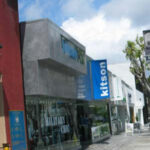Recent graffiti at the new Publix location in Newberry, Florida, has brought renewed attention to a dark chapter in local history. The messages, painted on the roadside sign and a storage container at the West Newberry Road site, named three victims of a 1916 lynching, an event known locally as the “Newberry Six” lynchings.
The graffiti read, “Gilbert & Mary Dennis were here,” and “Stella Young was here.” These names are of Gilbert and Mary Dennis, siblings, and Stella Young, all African Americans who were brutally lynched at the former Newberry picnic grounds, now the site of the new Publix. This horrific event occurred due to a racially charged dispute concerning stolen hogs. While the initial accused, Boisey Long, escaped, suspicion fell upon James Dennis for allegedly aiding Long. A mob then fatally shot James Dennis. Subsequently, law enforcement and a posse rounded up five other African Americans: Gilbert Dennis, Mary Dennis (James’s brother and pregnant sister), Stella Young (Boisey Long’s partner), Stella’s brother Andrew McHenry, and Rev. Joshua Baskin. These individuals were taken to the Newberry picnic grounds and hanged.
This act of vandalism, while condemned by local officials, has inadvertently amplified discussions surrounding racial injustice and historical accountability, resonating even in nearby Gainesville, a city with its own history of civil rights activism and ongoing dialogues about race relations. For residents in Gainesville and surrounding areas, including those who frequent Publix supermarkets across locations like those on Main Street in Gainesville, Florida, the incident serves as a stark reminder of the region’s complex past.
Boisey Long later surrendered and was convicted of murder for a death that occurred during his escape, yet no one was ever held accountable for the heinous lynchings of the other six individuals. An Alachua County grand jury investigated the lynch mob’s actions but failed to indict anyone.
In 2019, Newberry took a step towards acknowledging its past by unveiling a marker commemorating the lynching. However, the recent graffiti incident has reignited debate about the most effective ways to address historical injustices.
Newberry Mayor Jordan Marlowe expressed his disapproval of the vandalism. “The tragedies and crimes of the past should absolutely be acknowledged today. But, vandalism isn’t the way,” Marlowe stated. He further apologized to Publix for the graffiti, emphasizing that while Newberry is committed to public discussions and events to confront its history, “vandalism ‘doesn’t help that work.’” Mayor Marlowe stressed the importance of “healthy and respectful way that works towards unifying our community” in addressing these sensitive issues.
Publix media relations has not yet issued a public statement regarding the incident.
Despite the method, the graffiti has successfully brought the names of Gilbert and Mary Dennis, and Stella Young, back into public conversation. For communities in the wider Alachua County area, including Gainesville, this event prompts reflection on how historical events continue to shape the present and the ongoing need for open and honest dialogue about racial history and justice, even in everyday spaces like the parking lots of Publix stores.

